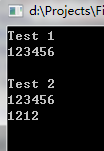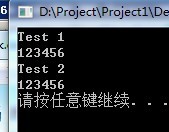65,209
社区成员
 发帖
发帖 与我相关
与我相关 我的任务
我的任务 分享
分享
cout << "Test 1" << endl;
char* bytes = "123456\0\0121212";
std::stringstream ss;
ss << bytes;
string str;
while (ss >> str)
{
std::cout << str << endl;
}
cout << endl;
cout << "Test 2" << endl;
bytes = "123456\0121212";
ss.str("");
ss.clear();
ss << bytes;
while (ss >> str)
{
std::cout << str << endl;
}


char* bytes = "123456\0\0121212";
char bytes[] = {'1','2'...'6','\0','\0','1'...}
 上大当了吧
上大当了吧